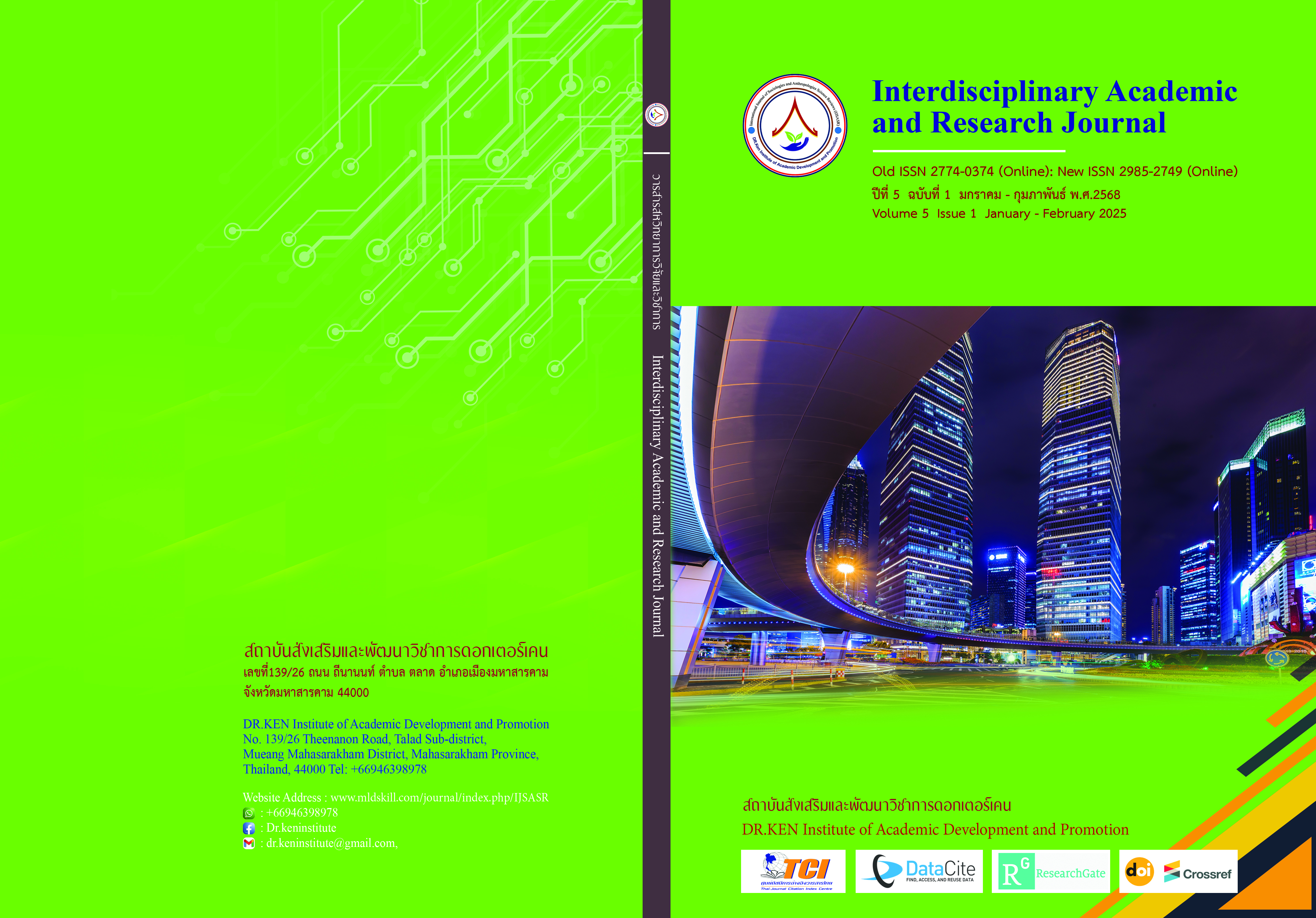Law Development and Innovations of Industrial Manufacturing under Thailand 4.00 Polity
DOI:
https://doi.org/10.60027/iarj.2025.280746Keywords:
Management innovation, Industry 4.0, Thailand 4.0 Policy, Eco-friendly industry, Technology and DigitalAbstract
Background and Aims: The research study on the development guidelines for laws and innovations in the management of manufacturing industries under the Thailand 4.0 policy aims to 1) Study problems, obstacles, legal limitations, and innovations in management of manufacturing industries under the Thailand 4.0 policy. 2) To study principles, concepts, theories, state policies, national strategies, and laws related to developing laws and innovations in the management of manufacturing industries under the Thailand 4.0 policy. 3) To study and analyze problems and determine guidelines for developing laws and innovations in management of manufacturing industries under the Thailand 4.0 policy. 4) To lead to the development of laws and innovations in management of manufacturing industries under the Thailand 4.0 policy.
Methodology: This research is a qualitative research by integrating 3 disciplines: law, public administration, and management by studying data from primary and secondary documents, including principles, concepts, related theories, policies, national environmental strategies, environmental master plans, foreign laws, and Thai laws, including data collection from field research, including in-depth interviews with 15 people and focus group discussions with 25 people, including listening to opinions with 50 people by specific selection from stakeholders. The data was analyzed and described descriptively.
Results: The research results found that 1) Currently, Thailand's manufacturing industry has a problem of lack of knowledge and innovation support, which affects the economy, society, and the environment. Innovation in the industrial sector is significant for driving the economy and national development. 2) Concepts and theories include good governance, new public administration principles, sustainable development principles and sustainable development goals (SDGs), the concept of holistic development according to the BCG Model, Industry 4.0 concept, management concept, linear economy theory, circular economy theory, preventive maintenance theory, and innovation theory. The aforementioned concepts and theories have been used by researchers to determine guidelines for the development of laws and innovations for managing the manufacturing industry under the Thailand 4.0 policy, including leaders in digital technology and innovation that this research studies, namely the People's Republic of China, the Federal Republic of Germany, the Republic of Korea and the United States, which have specified policies, national strategies and laws to drive Industry 4.0. As a result, these countries have legal mechanisms and policies for managing the manufacturing industry with efficient digital technology and innovation, in line with the guidelines of the Industry 4.0 revolution. 4) Thailand must adapt to the trends of the technology and digital world by determining the direction of industrial development according to the Thailand 4.0 policy with a development plan supporting finance, knowledge, and digital technology. Including the development of related personnel by adjusting and increasing skills to be able to work together with the use of digital technology effectively. 5) Proposing to amend the Federation of Thai Industries Act, B.E. 2530, and the Ministerial Regulations issued under the authority of the Promotion of the Utilization of Research and Innovation Results Act, B.E. 2564. In addition, 5 strategic policies were proposed: (1) Modern Management Strategy (2) Technology and Innovation Development Strategy (2) Government Support Strategy (3) Research Capability Development Strategy (5) Environmentally Friendly Industry Development Strategy.
Conclusion: It is proposed to amend the Federation of Thai Industries Act of 1987, Chapter 1, Section 6, and Section 8, and to set guidelines for the development of innovations in the management of the manufacturing industry under the Thailand 4.0 policy, a total of 5 strategies.
References
กระทรวงการอุดมศึกษาวิทยาศาสตร์ วิจัยและนวัตกรรม, (2567). โมเดลเศรษฐกิจสู่การพัฒนาที่ยั่งยืน. Retrieved on June 28, 2024 from: https://www3.rdi.ku.ac.th/wp-
กระทรวงอุตสาหกรรม, (2567). ยุทธศาสตร์การพัฒนาอุตสาหกรรมไทย 4.0 ระยะ 20 ปี (พ.ศ. 2560-2579). Retrieved on April 17, 2024 from: http://www.oie.go.th/sites/default/files/attachments
เกียรติพงษ์ อุดมธนะธีระ, (2566). ลักษณะสำคัญของนวัตกรรม (Innovation). Retrieved on October 26, 2023 from: https://www.iok2u.com/article/innovation/innovation-001-characteristics
คมกฤช จันทร์ขจร. (2560). ยุทธศาสตร์การจัดการศึกษาทางไกลในยุคประเทศไทย 4.0 ของสถาบันการศึกษาทางไกลสำนักงาน กศน. สถาบันพัฒนาครู คณาจารย์ และบุคลากรทางการศึกษา, สำนักงานปลัดกระทรวงศึกษาธิการ
ณัฐรัตน์ สุขใย. (2562). การศึกษาปัจจัยส่วนบุคคล การยอมรับเทคโนโลยี และวัฒนธรรมองค์กรที่ส่งผลต่อประสิทธิผลการทำงานของพนักงานธนาคารกรุงไทย จำกัด (มหาชน) สังกัดกลุ่มเครือข่ายภาคกลาง. กรุงเทพฯ: มหาวิทยาลัยกรุงเทพ.
ทองทิพภา วิริยะพันธุ์. (2561). การพัฒนาธุรกิจที่ยั่งยืน (Sustainable Business Development). กรุงเทพฯ: CMS Digital Print.
พฤทธิ์ เทศจีบ. (2566). การสร้างความยั่งยืนทางดิจิทัลในธุรกิจด้วยสถานที่ทำงานดิจิทัล. การประชุมวิชาการและการนำเสนอผลงานวิชาการระดับชาติครั้งที่ 7, ผ่านโปรแกรม Cisco WebEx, 6 มิถุนายน 2566, มหาวิทยาลัยหอการค้าไทย
พัชร์นรี ธนาคุณ. (2561). ระบบคัดเลือกกลุ่มธุรกิจที่ใช้นวัตกรรมในการขับเคลื่อน. วิทยานิพนธ์วิทยาศาสตรมหาบัณฑิต, สหสาขาวิชาธุรกิจเทคโนโลยีและการจัดการนวัตกรรม: จุฬาลงกรณ์มหาวิทยาลัย
สำนักงานคณะกรรมการพัฒนาการเศรษฐกิจและสังคมแห่งชาติ. (2565). แผนพัฒนาเศรษฐกิจและสังคมแห่งชาติ ฉบับที่ 13. กรุงเทพฯ: สำนักนายกรัฐมนตรี.
Downloads
Published
How to Cite
Issue
Section
License
Copyright (c) 2025 Interdisciplinary Academic and Research Journal

This work is licensed under a Creative Commons Attribution-NonCommercial-NoDerivatives 4.0 International License.
Copyright on any article in the Interdisciplinary Academic and Research Journal is retained by the author(s) under the under the Creative Commons Attribution-NonCommercial-NoDerivatives 4.0 International License. Permission to use text, content, images, etc. of publication. Any user to read, download, copy, distribute, print, search, or link to the full texts of articles, crawl them for indexing, pass them as data to software, or use them for any other lawful purpose. But do not use it for commercial use or with the intent to benefit any business.
















.png)


